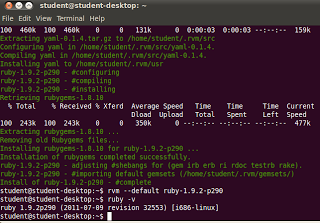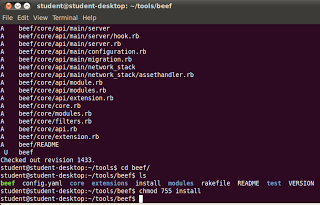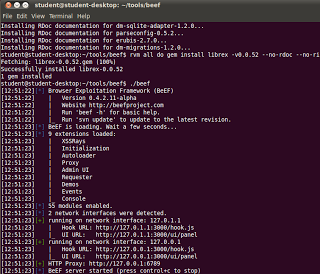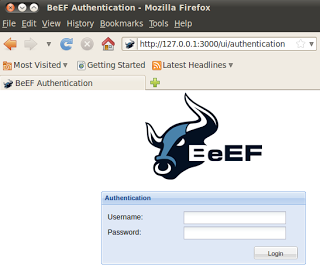
With RVM and ruby 1.9.2 installed, let’s move on to BeEF. I like to set up my tools in a tools directory, so let’s create the directory and download the framework - mkdir ~/tools cd ~/tools svn checkout http://beef.googlecode.com/svn/trunk/ beef cd beef. The framework comes with an install script to help make sure you have the prerequisite ruby gems installed for the framework to run. Let’s make the script executable and run it to see what we need. chmod 755 install
./install # The following is the output from the ./install command Welcome to the BeEF installer! Please make sure you have installed SQLite before proceeding. For instructions on how to do this please see the README file Some gems required by BEeF are not present on your system please select an option to continue: 1) Install all required gems automatically 2) List required gems and exit so they can be installed manually 3) Exit installer 2 Please run the following command to update and install all required gems: sudo gem install ansi term-ansicolor dm-core json data_objects do_sqlite3 sqlite3 dm-sqlite-adapter parseconfig erubis dm-migrations && sudo gem install librex -v0.0.52 –no-rdoc –no-ri We need to remember that we are using RVM to maintain our ruby environment and will have to install the needed gems with the rvm command and not apt-get. rvm all do gem install ansi term-ansicolor dm-core json data_objects do_sqlite3 sqlite3 dm-sqlite-adapter parseconfig erubis dm-migrations rvm all do gem install librex -v0.0.52 –no-rdoc –no-ri Now let’s fire up BeEF. ./beef
We now have the Browser Exploitation Framework installed and running on Ubuntu 10.04 LTS. Log into the web interface and let the good times roll. 🙂